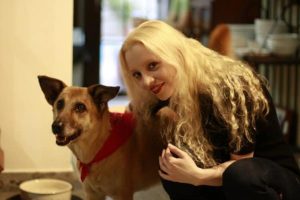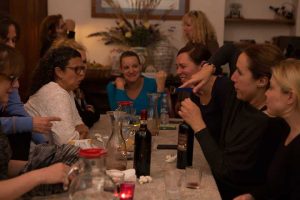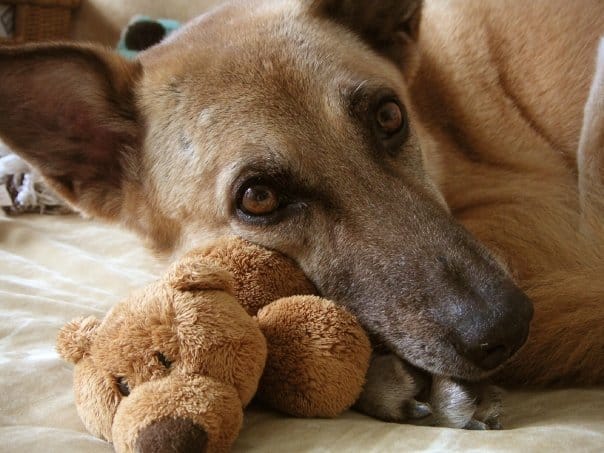By Kira Jane Buxton
“I think we should name him Dogless.” YaYa bounds up to my mother, her singsong staccato bouncing like the notes of a xylophone.
Em tucks a strand from her silky bob, the color of swirling pinot noir, and raises an eyebrow. “Dogless?”
“I think he look like a Dogless.”
“Well, I don’t think he could possibly be Dogless. But perhaps he could be Douglas.” Em has a speaking voice like Julie Andrews, water streaming through the Thames on an English summer day. Her singing voice, alas, is less like Julie Andrews, unless Ms. Andrews is getting run over by a combine harvester.
“Yes. That’s what I said. Dogless.” Yaya, which means auntie in Tagalog, is employed by our family. She has limbs like satay sticks, skin like Singapore soil, and a jack-o-lantern smile. “I don’t think he can bark.”
The subject in question stands in a make-shift pen in the yard of our large house, gargantuan by Singapore standards. The morning is punctuated by the serenade of cicadas and the shrill shrieks of exotic, full throated birds: the symphony of the tropics. The humidity sits like a heavy conscience on shoulders, moistening lungs and feeding the blunt blades of fat grass and surrounding banana trees.
Douglas is silent. His head is hung low, his brown fur lank and dingy, slipping off his jutting bones. 
So here lies the plush-haired problem. Can he be trusted? Will he pose a danger? Especially given the nature of what he has just been through. Once he has recovered from the shock of his traumatic experience, will he lash out at those around him, seeking fanged vengeance for his lack of a stable puppyhood and who or whatever inflicted the map of angry grey scars across his head? If he is some sort of Shepherd hybrid there is no guarantee that we are dealing with Rin Tin Tin here, and if he is part dingo—well, it is rumored they have a highly developed palate for Australian infants.
There are lives to be protected. Upstairs sleep the last two of our Siamese lineage, feline octogenarians who are at this well earned stage of their lives unwinding, hollow-hipped and delicate as dandelions. The tiny blue-eyed hell-kittens who used to claw climb their way up our curtains, tearing around the house with a piece of tissue bigger than themselves, are now aged little sun seekers who dream of catnip and severely disabled mice. As with their ancestors in ancient Siam, our seal-pointed angels are the guardians of our temple. We vehemently defend their right to age in dignity, to a bonito-flake sprinkled retirement. No, there are two many risks. Em will find him a home, however difficult it will be to place an older junkyard dog. A bag of fleas and pleas.
Over the next couple of weeks, the vet declares that there is a war on Douglas’s heart. It is discovered that he has hundreds of little wriggling white assailants on his most vital, life-sustaining organ. Heart-worm. He is given medication and an uncertain prognosis. The vet tells Em that the success of his recovery is up to Douglas. He acquires his first license, so that he is finally, at the estimated age of eight, legal in his birthplace of Singapore. On it he is categorized as: Mixed Breed, Color Brown. He undergoes a series of injections plunged directly into the muscles of his back. One of them paralyses him temporarily. Douglas does not complain. And still, he does not bark.
“And where did you find this…Douglas?” our wisp of a vet asks.
Em fixes her eyes, a watercolor study in blue, on the silent patient. “We fished him out of a drain in the middle of a storm. He was drowning.” She goes on to tell of how after a lunch, she and a friend from Down Under stumbled upon this desperate creature in the throes of a monsoon downpour. Stuck in a Singapore storm drain, the roiling water fizzed and bubbled up around him. Greedy waves pounded at his wormy heart and the churning debris, sucking them out to the Quays. The drenched dog thrashed and shuddered to the cracks of thunder and electric licks that tore through a frightful black sky. Douglas was fighting for his life.
Umbrella-helmeted people passed and pointed, but did nothing.
“I’m going in!” cried Em, whose heaviest attribute is her heart and who weighs about a buck o’five even when drenched in a torrential downpour. Em’s lunch companion quickly embodied the voice of reason, perhaps envisioning my small English mother disappearing down the sewer like a bobbing tic tac, and they compromised by flagging down help from some nearby construction workers. One worker shimmied down the side of a mud-slick bank and lassoed Douglas, pulling him up four feet of wall by his neck. Douglas did not bark.
The heart-worm treatment eventually has an effect on Douglas. Yaya runs in to grab my mother, her hair electric with frizz. “Look! Look what he did!” Yaya jabs a finger at the pen where Douglas is sequestered. Douglas sits at the far side, closest to the yard. He has his nose in the air, for the first time refusing eye contact with Em, all but whistling at the sky.
And there is a smell. The kind of smell that can curl your shoes into elf slippers. Em slowly traverses the pristine tile, bloodhound senses switched on to locate the origin of the offensive odor. She finds a couple of curious items. A misplaced door mat. Two shoes, lying close to one another. Another door mat. Em lifts up the first doormat and underneath it: Eureka! Douglas had an accident. Under the shoe: another accident. Fearing he might ruin his chances of an invite to the temple of Siam, Douglas selected two doormats and two of Yaya’s shoes (mis-matched since he seemed to understand that they come in pairs, but wasn’t too particular about a color scheme) to cover up the consequences of a tummy upset. A sort of advent calendar of excrement.
As time goes by, Douglas and Em spend more and more time together. He follows her around outside like an imprinted duckling, silent but for claws clicking on tile, and she tells him in a fruity voice about how he should behave and what is expected of him. And perhaps the strangest thing of all is that he seems to listen, chewed antenna ears doggedly tuned in. As if his uttermost desire overrides the language and species barrier, this dog who has no training, no comprehension of love and had to be shown how to eat a proper meal from a bowl. This dog who is terrified of anyone touching his back or approaching him from behind, the phantoms and invisible scars of an abusive past. Before long, he is allowed into the kitchen downstairs, where he minds his p’s and q’s, continuing his resolute study and crash course in Dog Etiquette 101, still never barking.
One afternoon, Masman, the last male of our Siamese legacy who is notoriously high-strung (he was prescribed human-strength valium for a short stint) and intolerant of other four-legged beings, erupts from his upstairs kingdom. His swagger is raw, a little gangster, and he is beginning to greatly resemble Clint Eastwood in his golden years. Our family’s love for this rickety sliver of a feline swells to fill the temple—there are only a few years of my entire life that have been Masman-less (before we had cats I only had my beloved horse, Trigger, who was in actual fact an empty suitcase). Masman takes a bolshie saunter down the stairs, making a beeline for Douglas.
“This is my realm, ya filthy animal. Go ahead, make my day,” Masman seems to say, which I realize is a bit silly, because we all know that if cats could talk, they wouldn’t. He struts right under the nose of the towering, unpredictable canine. Yaya and Em hold their breath, poised to extract our sacred toothpick of a cat from fang-lined jaws. Masman does a Courtney Love stagger through Douglas’s legs. Douglas watches. His nose twitches as Masman picks it for him with the tip of his tail. A flash of something crosses those deep chestnut eyes, the canine cogs and wheels turning. Douglas then looks up at Em with a look that says, “I listened to every word and I understand: this guy is the boss.” He cocks his head and watches His Royal Felineness reveling in the knowledge that he has still got it, can still turn it on and be a fishy little twerp. Masman waddles drunkenly across the kitchen. And still, Douglas does not bark.
Yaya and Douglas take several daily walks under a sweltering Singapore sun, in morning mists and through sheets of hot, wet rain. There are so many because Douglas has set a hard and fast rule early on in the game—he will not go to the restroom in the backyard. Or anywhere near the temple. The walks quickly become as much about a relief break as confidence building. Soon Mixed Breed, Color Brown’s coat shines a fawn copper in the sun, his bushy, vulpine tail held high. His back legs are extraordinarily fluffy: Mr Tumnus legs. His deep barrel chest fills out and his walk changes, now a trot with new zest, steps as particular and deliberate as a fresh lottery winner’s might be. Something about him sends all the neighborhood dogs into a slobbering, tooth-bearing frenzy, and we are not sure of the silent vibes he gives off, whether he is exhibiting some subtle canine flip of the bird, can’t shed his ruffian’s past, or if the other dogs recognize there is something a little different about him too.
People stop Em on the sun-baked street. “Your dog looks like a fox! And look at his eyes…he’s so soulful. I feel like he’s about to start speaking!”
Each day, Douglas takes himself outside for mediative breaks in the yard. He picks a quiet spot, breathes deeply and admires the gifts around him: paper-winged butterflies that pirouette across the green, the plodding journey of a fat-bellied frog. He sniffs measuredly at the subtleties of an ever-changing air, watching the light dance in ripples across the surface of our aquamarine pool.
Douglas then decides he is ready for employment. It occurs to him that he would best serve as Head Watchman And Keeper Of The Temple. And finally, we hear his first bark. As soon as the gates to the temple let out a newborn mouse’s squeak, Douglas lifts his nose to the sky and releases a succession of deep, sonorous booms, worthy of any pedigreed guard dog. He is warning off intruders and alerting his people. The temple must stay safe.
Friends fall in love with Douglas, strangers fall in love with Douglas, everyone falls in love with Douglas. He gazes up into your eyes, trying to speak, lips attempting to form words, to overcome a minor chromosomal difference and launch into a conversation about the intricacies of metaphysics. He has started to share his smile, which he often pairs with a contented snort. One family friend, after an evening of musing on Douglas’s soulful face, ruffling through tufts of his soft teddy fur, turns to his wife and famously coos, “I don’t want a dog. I want a Doug.” And thus, we become a bi-petual family.
And so Douglas moves into the temple, even gains possessions. Like a bed where he can rest the bald spots on his legs, rubbed raw from years of sleeping on scorching cement. Like toys that he never learns to play with, but uses as pillows and keeps close to his bed for comfort, out of respect. Like his own water and food bowl that he patiently allows Masman, the Charlie Sheen of kitties, to help himself to as he all but extends a middle claw mid butt-wiggle—that spicy senior citizen. We never ask Douglas about his past and he doesn’t seem particularly keen to revisit it, instead reveling in every moment of his time with his new pack, his people.
Douglas continues his duties when we move house in Singapore. He insists on running to each ledge Em approaches while swimming laps, where he sniffs her vigorously, preparing to run and greet her at the other end and make sure she is safe, always ready to rescue her back. It is quite a workout. He helps Em in her never-ending quest to pluck out the senseless Singapore wildlife that seems intent on drowning in our pool, and when Em finds a litter of bedraggled, palm-sized kittens, after a careful explanation about boundaries and the frailty of their tiny structures, he allows them to crawl all over him: Uncle Douglas the jungle gym.
The day comes when we must say goodbye to Masman, whose seventeen year old body is ready for a rest. My sister and I sit together under the gazebo, silent but for the cracking of hearts and the sobbing for our seal-point baby who taught us how big love can be. Douglas sits between us, a monument of respect. He seems to understand and matches our melancholy, allowing us to take comfort in his fur, losing our fingers to the dense, wiry undercoat. Douglas becomes the main man of the temple, but he does not allow his high standards to slip nor his head to swell, never forgetting his roots, as knotty and twisted as they might have been. He has high expectations and when mistakes are made—such as when he knocks over a vase with his bottlebrush tail—he sits next to it and waits for Em. He lasers her with those deep, haunting eyes. “I did this, Em. I’m sorry. And I want to make it better.”
Em and Pops get the news that they are moving to London. By this time Douglas is a senior citizen himself, suffering from vestibular disease and degenerative muscular problems. His equilibrium is shaky, his back legs have started to go and his teeth sometimes chatter uncontrollably. He has his first life-threatening seizure. But none of these episodes tamper with his sunny disposition and as soon as he falls over, he hoists himself back up, smiles his gummy dog-breath smile in the hopes you will pity him enough to throw a biscuit in his vicinity. Discussions about whether good ol’ Doug will weather the long journey occur. How will a dog with such a precarious past, who has only ever known the spiced soils of Singapore take to the cold, steely lego-maze that is London? Douglas assures us he will be fine, he is a family member after all. With veterinary supervision, he makes the fourteen hour flight. He does not complain. He does not bark.
And against all odds, Mixed Breed: Color Brown takes to it like a mallard to a Richmond pond, quickly becoming an English gentleman and slotting into life in the quaint town of Teddington. He dons a dapper wintergreen coat with a lip of tartan and is met by the charming townsfolk who are polite, decked in designer, Gucci purses often harboring milk bones. “Well aren’t you just a handsome fellow? How old are you, old chap? Oh, how lovely! You have legs like Mr Tumnus!”
Tiny, button-eyed children with biscuit-breath point at him, their cherub cheeks pink with delight. “Fox, mummy! Fox!” They smile at Douglas, full of wonder in that special stage before the magic is gone, and he smiles back, all gums, yellowing teeth, puffing clouds of milk-bone breath. He meets real urban foxes around the town, many of who follow him in fascination as he calmly traverses the streets, sealing his title: King Of The Foxes. Another perk of the great English immigration is that dogs are allowed into pubs, which is a boon seeing as Teddington has more pubs per square inch than anywhere on earth. During Em and Douglas’s slow, pottering walks where he urinates in five minute streams (a side effect of his medications), maneuvering a squiggly yellow signature—Douglassss—he often drags her into a pub for a drink by the fireplace and some chips. The pub patrons talk to him, offer a polite snack and even turn a blind eye when he starts to lose control of his bowel movements. He is awarded the privileges of an old man: respect, patience and dignity as he navigates the winter of his life, the frosts of time crystalizing his joints and slowing his vessel. For two years, Em declares herself on Douglas duty, spending her days cleaning up after our fox king, feeding him, struggling to carry his sixty pound vessel for mini-walks and never leaving his side. No one can seem to remember who rescued whom.
The day comes when Douglas’s body is ready for a rest. The vet—the McDreamy of animal healing—comes over to assess the situation and we all, as his pack, privileged and proud, decide that it is time. We say goodbye. After a Three Stooges moment where the vet jabs himself with the euthanasia needle (apparently this is a fairly regular occurrence) we sit with our Douglas as his body and those faltering, exhausted muscles relax. Douglas’s vessel, like Masman’s, gets its well deserved peace, free from the angry scars, the jittering muscles, the crumbling bones. And we grieve. How we grieve. Jagged rocks form in my throat, tearing to get out, tears pour down my neck. I squeeze my sister’s hand. We drink a lot that night. A LOT. We are discombobulated and ding’swizzled. Dog drunk. We can barely speak, slurring like Captain Jack Sparrow, moving our lips in an attempt to form words in the way our Douglas would always do.
And when we get all that out of our livers, we celebrate. Because we will never lose Douglas. And there is so much to celebrate. There are no regrets, only crystalline, free-flowing gratitude. I think about the lessons to be learned from the remarkable life of Douglas. The lessons are transcendent, sparking in their simplicity:
- Don’t be frivolous with your barks and words. Save them for good use and good purpose. Use them wisely.
- Never shit in your own backyard. Take a trip around the block and shit over there. Respect your temple.
- Don’t make your life all about the “things.” Have a few things—bed, food bowls, some toys—be appreciative and respect them, but don’t lord or hoard. Save your love for what really matters.
- First impressions count. Make sure that you are polite, and respectful.
- Find a job you love and do it well. Do it with passion, zest and a little personal flair (fancy tricks should always be rewarded.)
- Enjoy a walk. Pay attention to the natural world around you. Enjoy yourself.
- Breathe.
- Don’t let your past, whether you didn’t play well with others, had a penchant for bitch fights or a howlingly breezy time of things, define you. We must not forget where we came from. But we can overcome it. Hell, cover it with a couple of doormats and some shoes—learn, transform and move on. Be present, be open and become the best you can be by making the most of every minute you have.
- Be polite to strangers. You never know which of them might have a secret snausage stash.
- It feels good. Do it even if you have dog breath.
- Be patient and good. The things you want the most will come. You too, with the right manners and perseverance, can score an invitation to the temple.
- Treat yourself. Most ordeals, especially sad ones, merit a biscuit.
- Take care of your pack. They will do right by you. Do right by them.
- Above all: don’t hold back your love or loyalty. Love, love, love. Show your pack you love them and give them daily reminders that you are there for them.
So we celebrate the life of our Douglas, King of the Foxes, whose eyes held something wild, something otherworldly, a polaroid of another life. And that beautiful energy didn’t disappear. His death is just a transition like his soggy eruption into our life, or his distinguished emigration to England. These are all just steps in a journey that none of us can fully control, that we have the privilege to adventure through in our vessels as we navigate the monsoon storm of life.
Energy, by its nature, transforms and changes state. His energy lives on in me, in my family, in those he touched, in the button-eyed children he delighted, in the foxes who shadowed him. It is only the shell that is gone, a shell that was scarred by the unknown, a brave heart, a tired body. His heart, even when ravaged by hungry parasites, gave us its all—its work was done. Who could ask for more?
Maybe you have had a Douglas in your life. And if you are lucky enough to still have a Douglas in your life, make the most of the time and don’t be afraid to let them go. Because they change who you are, soften and bolster your weathered heart, forever with you as you continue on your journey. Sometimes our greatest gifts come in the unlikeliest of packages: waterlogged, partially chewed, with unknown pasts and legs like Mr Tumnus.
And we are ready now. Ready to take in the next helpless, one-eyed, asymmetrical tripod of a pet. Because we know we will never be dogless.



Well that was just beautiful. Thank you for so eloquently sharing sage Douglas with the world.
Oh my ….. you do know dogs and their people … so beautifully written, made me weep. I have not been dogless for fifty years now. Can’t imagine life without a couple of them in it. Even compared to my beloved human friends, they have been my best companions, my biggest gift in life.
nancy
simply beautiful. as I sit here with my best friend Rudy by my side, and my wonderful cleo napping on her perch… glassy eyed and full of memories, wonderful and sad all at the same time. I couldn’t make it through this life without them and those that have already gone …the ones that are to come… thank you for sharing douglas with us all.